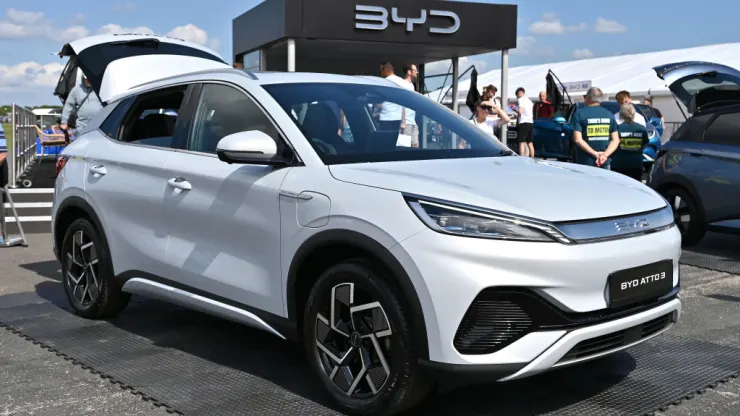Shares of BYD jump after Chinese EV maker posts 200% surge in first half profit

BYD’s China-listed shares jumped more than 5% Tuesday after the company reported impressive first-half earnings.
Record deliveries contributed to a 204.68% jump in net profit for the first half of the year for the Chinese electric vehicle maker – that’s 10.95 billion yuan ($1.50 billion) in January to June, compared to 3.59 billion yuan a year ago.
The automaker’s Hong Kong listed shares rose 5.6% on Tuesday, while stocks in Shenzhen gained 4.75%.
As the company explained in a stock filing, the strong numbers were mainly due to rapid growth in the new energy vehicle business.
As reported in the stock filing, revenue grew 72.72% in the first half of 2022 compared to the first half of 2021.
The top line growth at BYD has been very strong, but we are even more impressed with the margins. The gross margin for BYD in the first half of the year was 18%. This is Tesla’s gross margin, according to Jiong Shao, an analyst at Barclays.
It was the best-ever quarter for China’s top-selling car brand. Passenger new energy vehicle sales increased about 98% year-over-year in the second quarter to 700,244 units.
Tesla, on the other hand, delivered 466,140 vehicles globally for the second quarter.
Sales and production of automobiles in China are the largest in the world. As the world’s largest EV market, it has also been a key driving force for electric vehicles.
In an interview with CNBC’s “Street Signs Asia,” Vivek Vaidya, associate partner at Frost & Sullivan, said BYD is targeting the mass market where Tesla cannot reach.
According to Vaidya, Chinese-made vehicles will have a significant price advantage over Tesla, with similar features and stunning looks.
Price war
In addition to Tesla, BYD is facing price competition from domestic rivals.
As a way to gain market share amid rising competition in China, Elon Musk’s EV maker slashed prices for Model S and Model X in August. Tesla also cut its Model 3 and Model Y prices during the same month.
Nio and Xpeng, BYD’s domestic competitors, have also lowered their prices earlier this year.
As Shao from Barclays told CNBC’s “Squawk Box Asia” on Tuesday, the lower price to squeeze out the weaker players is good for the industry’s health. According to Shao, BYD’s operating margin was 5%, which is a pretty healthy margin, since many Chinese EV companies even have negative gross margins.
China’s economic recovery has been weaker than expected after Covid restrictions were lifted, which led to price cuts.
As many products as possible are being offered at lower prices, according to Vaidya of Frost & Sullivan.
There is a slight difference between electric vehicles and internal combustion engines. The OEMs who sell EVs make money too,” said Vaidya, referring in this case to Tesla, an original equipment manufacturer.
